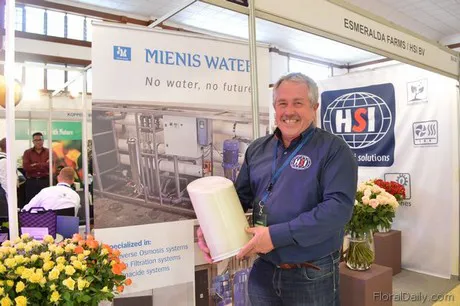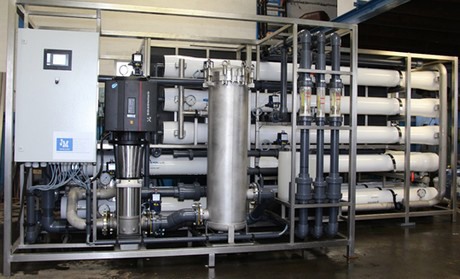
Jochum Genuit at the IFTEX in Nairobi, Kenya.
Commonly used in the Netherlands
In the Netherlands, the RO systems have been used by growers for many years now. "About 40 years ago surface water was not good enough anymore. The salinity of the water was increasing and several elements were slowing down the growth of the crop. Only two water sources seem good enough to solve that problem; rainwater and Reverse osmosis (RO) water. These water types are so clean, that farmers could benefit from a better production and a higher quality", he says.
Growing interest East Africa
For a couple of years, the demand for RO water has increased among flower growers from other countries too. "The East African countries such as Ethiopia, Egypt and Kenya in particular, are increasingly looking for ways to enhance the quality of their flowers and increase the productivity per square meter. They are aware of the importance of water quality and treatment and are therefore increasingly interested in RO systems. Over the last four years, for example, we have installed 8 systems in Ethiopia."

Investment and payback period
Installing a RO system is a large investment, but according to Genuit the payback period is relatively short. "Over the the years we managed to improve our RO system and make them more durable. It does not only increase the productivity of the crop, but it also saves money on other areas, like removing acids in the water. According to our clients, the return on investment (ROI) on the RO investment is in most cases between one and two and a half years. We even had cases within a year."
However, reaching this payback period, the RO system needs to perform well. "Most systems need a lot of maintenance and the lifespan of the membranes is too short. In the 45 years, that we have been producing RO systems we always adjusted the systems to the demands of our clients. In the African Rift Valley for example, there have been some challenges. We have tested several of our new systems in that area and we succeeded to lower the maintenance cost, chemical cost and electricity costs."
Future plans
In the future, Mienis Water is planning to expand, and not only within Eastern Africa but also in the rest of the world. "Water is the gold of the future. Because of the growing population, negative environmental consequences are growing as well. Water recycling and water treatment before discharging is essential. More and more flower farmers are taking their responsibility and investing in solutions. Mienis water is supplying systems for this purpose and expecting a growing market in that field."
For more information
Mienis Water
Jochum Genuit
Email: Jochum@mienis-water.nl / info@mienis-water.nl
www.mienis-water.nl
